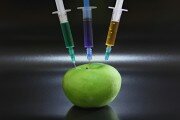Environmental Health: Harmful BPA Chemical In Dental Fillings
Those of us who live in the UK were relieved when baby bottles containing the industrial chemical Bisphenol A (BPA) had to be removed from all store shelves across the EU on 1 June 2011… At the time John Dalli, Health and Consumer Policy Commissioner, said: ” Due to the fact that there are uncertainties concerning the effect of the exposure of infants to Bisphenol A, the Commission deemed it both necessary and appropriate to take action. The aim is to further reduce the exposure of the most vulnerable part of our population – i.e. infants.”
However, for the folks in the US, things did not quite happen so fast. Back in May this year, the Natural Resources Defence Council petitioned the American Food and Drug Administration (FDA) to ban the use of BPA in any container where food makes contact with Bisphenol A.
But instead of reviewing existing evidence, FDA scientists conducted their own BPA research. The final opinion from FDA researchers: Blood levels of Bisphenol A are too low to do any harm.
In short: Don’t worry your pretty little heads about daily BPA intake. Now run along!.. Yet, finally the FDA enforced the same ban as in Europe, despite the fact that warnings about the dangers of this toxin have been doing the rounds since 2002.
Not on the 13th hour
But let’s not be fooled here. The real reason why Bisphenol A has only been banned now, is not because it is unsafe. It’s because consumers became aware that it’s unsafe. If the baby bottle industry knew about Bisphenol A dangers, but consumers didn’t, do you think the industry would have gone to great lengths to remove it?
Of course not!
Don’t get me wrong. It’s a good thing that children are getting less Bisphenol A exposure. But it’s because of the PR and sales effect of being able to put a “BPA-free” sticker on a bottle, not the 13th hour move by the FDA.
And to prove it, FDA officials have made it clear they don’t intend to take any further steps to limit Bisphenol A use… which means that it will still be in other plastic and canned food containers, water bottles etc. This is not just in the US, but also in the UK and the rest of Europe… See the ban is on Bisphenol A in bottles, not on BPA itself.
Bad News
As I’ve mentioned before, BPA disrupts hormonal activity. And with each year, we’ve seen mounting evidence that it promotes cancer, birth defects, heart disease, and type 2 diabetes. So imagine my disgust when I learned where else our children and grandchildren are bombarded with this poison.
In their fillings!
For many years, scientists have known that BPA exposure is potentially dangerous. And yet, someone developed a type of tooth filling – for use in children! – that contains Bisphenol A.
So they’ve taken BPA bottles out of the mouths of our children, and then EMBEDDED BPA in their teeth!
And the results won’t surprise anyone. Not anyone paying attention anyway. In a new study, children with BPA fillings were more likely to have emotional issues, including depression and anxiety.
And this was just a five-year study. Many children will have these fillings their entire lives!
Just when we got the word out on Mercury, now this!
Add to that, the use of BPA fillings is growing because they’re “tooth coloured.”
Parents, you can avoid Bisphenol A fillings by asking your child’s dentist about another type of filling. It’s called a “componer.” The new BPA study also included children with componer fillings. The researchers found no links between componers and behavioural problems.
Did you find this information useful?
Then why not get more expert health recommendations just like this delivered direct to your inbox?
"It is truly refreshing to read a newsletter on the topic of alternative medicine which is scientifically based and reviewed by professionals..." - Robert Sinott
We respect your privacy and will never share your details with anyone else.Disclaimer: Bear in mind the material contained in this article is provided for information purposes only. We are not addressing anyone’s personal situation. Please consult with your own physician before acting on any recommendations contained herein.
Sources:
“FDA officially bans BPA, or bisphenol-A, from baby bottles” Wendy Koch, USA Today, 7/17/12, usatoday.com
“Dental Composite Restorations and Psychosocial Function in Children” Pediatrics, Published online ahead of print, 7/16/12, pediatrics.aappublications.org
“BPA in tooth fillings may boost kids’ behavioral problems” Ryan Jaslow, CBS News, 7/16/12, cbsnews.com










